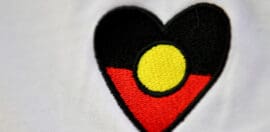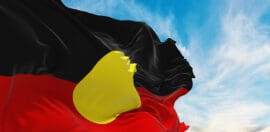How ‘yindyamarra’ informed a business acquisition

Image supplied by Visual Dreaming; artwork created by Jade Kennedy.
12 October 2022 at 3:25 pm
First Nations tech company Visual Dreaming to acquire non-Indigenous organisation Hitnet.
‘Tech for good’ organisation Hitnet has been working with Aboriginal and Torres Strait Islander people for over 20 years, but its recent move is going further to amplify Indigenous voices.
Co-founder and director Julie Gibson has ceded the company, which brings information and services to close the digital exclusion gap in rural and remote communities, to Visual Dreaming, a First Nations technology platform drawing on cultural practices and storytelling to support Indigenous youth.
For Gibson, the business move acts as a symbol for the non-Indigenous community to make room for First Nations organisations in an authentic and meaningful way.
“Myself and the other founders strongly believe that Hitnet needed First Nations innovation, knowledge, creativity and entrepreneurship to take it to the next level,” said Gibson. “It was actually us that approached Visual Dreaming after a national search of actively looking to transition out.”
“I think the time has well and truly come for businesses that operate in the First Nations space to have management structures to ensure there is solid First Nations representation, which is not tokenism, but genuine ownership and control.”
The acquisition process itself, which will see Hitnet’s brand completely absorbed into Visual Dreaming, was not a traditional one. Instead, Gibson, who is not Indigenous herself, formed a relationship with Visual Dreaming’s CEO and founder Leanne Sanders, a Kamilaroi, Tati Tati, Wadi Wadi and Mutti Mutti woman living on Wiradjuri Country, through the concept of ‘yindyamarra’.
“Yindyamarra is about respect, going slowly and gently, and honouring all things. It’s really a lifestyle and it’s key to living on Country,” explained Sanders.
“When I first mentioned yindyamarra to Julie, she honoured and respected it in every step of the way in the business process. Going slowly is really challenging, especially as an entrepreneur, but when we stop and take our time, we can have a greater impact.”
Yindyamarra and its slow connection principles informed the entire business acquisition, which involved a national search, several months of strategic discussions, and a visit by Gibson to Visual Dreaming’s home of Wagga Wagga on Wiradjuri Country in regional NSW.
Ensuring a culturally appropriate process, Gibson also engaged the services of a cultural advisor who attended meetings and travelled to Wagga Wagga to visibly demonstrate respect to the community.
“The way that yindyamarra translated to me as a non-Indigenous person was that we had open and ongoing initial discussions before I eventually went to Wagga Wagga to meet with the Elders, Leanne and other members of the Visual Dreaming team. I was welcomed to Country and the Elders spoke in language which was incredibly moving,” continued Gibson.
“During that trip, I presented Hitnet to the Elders and community and had to explain my intentions and answer any questions the Elders had, because they’re very protective of Leanne. I felt it was very important to make sure that they were comfortable with everything that we were looking to do.”
“With my Western business hat on, I of course always want things to go quicker. But there’s a process and practice that we’re embracing, and it’s definitely been a much richer experience for that. I don’t necessarily think we would have got to the positions we’re in now if we hadn’t followed that.”
While both founders cited their shared values and aligned missions as important contributors to the success of the acquisition, Sanders said that Gibson gaining the trust of her community and being open to regular and honest conversations was the critical factor in ultimately facilitating the business move.
“A lot of mob do get taken advantage of but having Aunties around made a massive difference and I felt instantly in a safe space,” explained Sanders.
“I think for a lot of First Nations people that are in business or trying to create social change, we do it because we are connected to our communities, and we are connected to the strengths, but also the struggles.
“Having Julie come down and having that community support, if I didn’t have that, I wouldn’t have felt that it wasn’t the right journey and we wouldn’t be this far together. It’s so important to build that community trust.”
The newly expanded Visual Dreaming team will initially use its extended technology platform to run two pilot programs, one in Wagga Wagga and another in a separate remote NSW community, which will see the development of technology hubs that will deliver culturally appropriate health and social information directly to Aboriginal and Torres Strait Islander people.
Gibson will remain involved in enabling the transition of Hitnet to Visual Dreaming and will also continue as part of the governance of the new entity in an ongoing capacity.







